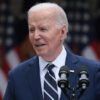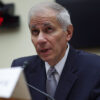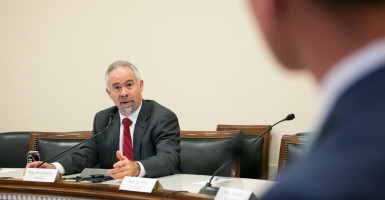Conservative lawmakers attacked President Barack Obama’s decision to make the U.S. part of an international agreement on climate change, calling the deal an attempt to circumvent Congress.
Rep. Tim Huelskamp, R-Kan., said Wednesday at a monthly Capitol Hill meeting between House conservatives and reporters that Obama is “desperately seeking some type of legacy and this attempt is another lawless attempt to impose his will through a regulatory structure and attempting to bypass the U.S. Senate.”
Huelskamp added during the “Conversations with Conservatives” event:
“You would think a few Democrats in the Senate would actually recognize that this is a violation of the Constitution. He’s [Obama] trying to bypass Congress and bypass the Constitution.”
.@CongHuelskamp on #ParisAgreement: You'd think Democrats in the Senate would recognize this is a violation of the Constitution." #cwc114
— The Daily Signal (@DailySignal) April 27, 2016
Capping the worldwide celebration of Earth Day, Kerry signed the Paris climate change agreement Friday night in New York City with leaders and diplomats from 174 other countries.
“The agreement wouldn’t mean a whole lot because it doesn’t have the force of a treaty and it would be nonbinding,” Rep. Scott Perry, R-Pa., said at the Capitol Hill gathering with reporters.
“I think that Congress will need to act at some point,” Perry added.
Perry noted that a clause in the Clean Air Act—a federal law passed in 1963 designed to control air pollution—is particularly burdensome to the electric power industry.
Kerry said Friday at the opening ceremony before the signing of the climate agreement:
Paris marked the moment when the world finally decided to heed the ever-rising mountain of evidence that had been piling up for years. It marked the moment that we put to rest once and for all the debate over whether climate change is real—and began instead to galvanize our focus on how, as a global community, we are going to address the irrefutable reality that nature is changing at an increasingly rapid pace due to our own choices.
The climate agreement strives to reduce greenhouse gas emissions around the globe, according to its backers.
Economist Nicolas Loris, a research fellow at The Heritage Foundation, wrote about the reasons Congress should reject the agreement. Among them: It will create higher energy bills for consumers, kill jobs, fund a massive transfer of wealth to green initiatives, and have little real impact on climate change.
Loris wrote that a “top-down, concentrated effort to shift away from the use of coal, oil, and natural gas will prevent millions from enjoying the basic energy needs Americans and the developed world takes for granted.”
In December, Obama said of the just-concluded climate deal:
Two weeks ago, in Paris, I said before the world that we needed a strong global agreement to accomplish this goal—an enduring agreement that reduces global carbon pollution and sets the world on a course to a low-carbon future. A few hours ago, we succeeded. We came together … We met the moment.
Rep. Dave Brat, R-Va., questioned the efficacy of the movement to stem the impact of climate change, citing the potentially adverse economic influence of the measures.
"Global warming is testable. Climate change isn't. It's just up or down any way around." @RepDaveBrat #ClimateChange
— CWC (@conversations) April 27, 2016
“Global warming is a testable hypothesis,” Brat told reporters Wednesday. “Climate change is not. Climate change is just up or down any way around. I think everyone on this panel is committed to science. Over the last 16 years, we’ve got some data points that look relatively flat.”
“I’m happy to look at the science on this kind of thing, but in economics, it’s funny our friends on the other side of the aisle aren’t aware of a science called economics,” Brat said.





























